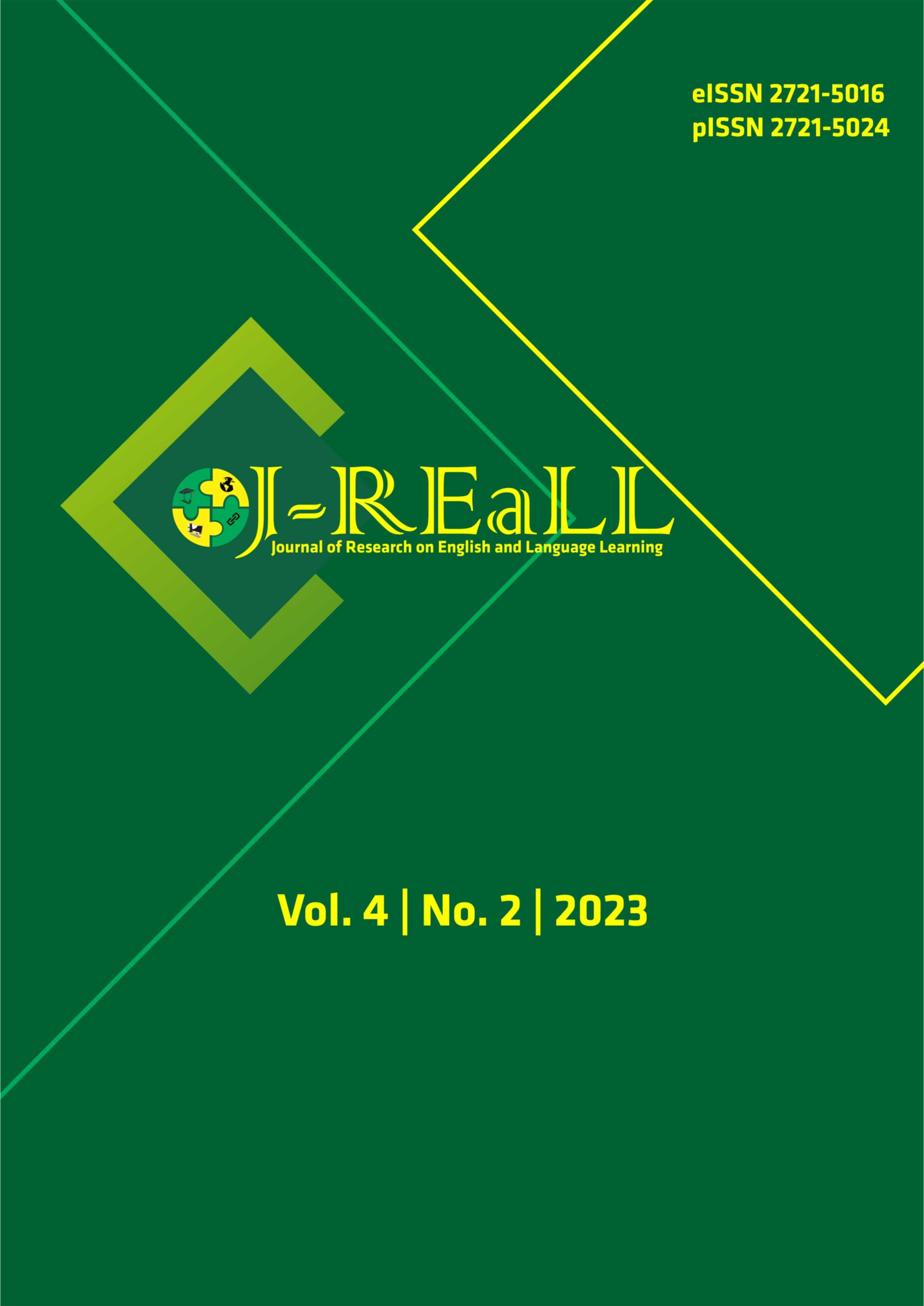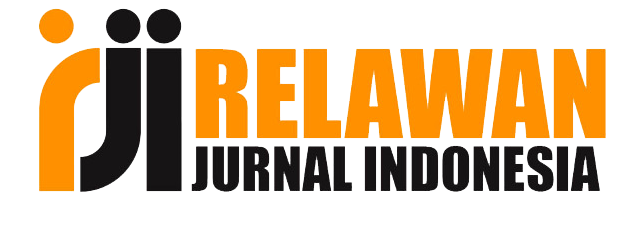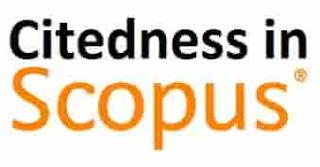EFL students' perceptions towards Quizizz usage in English subject formative assessment
DOI:
https://doi.org/10.33474/j-reall.v4i2.20309Keywords:
Assessment tool, Quizizz, formative assessment, UTAUTAbstract
Currently, developing technology encourages English teachers to be able to use several educational platforms. Quizizz is one of the educational innovations carried out to achieve learning goals. This study uses a qualitative descriptive research method. In this research, the focus is on exploring how students perceive Quizizz, a formative assessment tool rooted in the Unified Theory of Acceptance and Use of Technology (UTAUT). The study adapts and customizes an interview guide from prior research and investigates four aspects: performance expectations, effort expectations, social influence, and facilitating conditions. Researchers conducted research at SMK Sumber Ilmu Tulangan, using Quizizz as a formative assessment tool in English lessons. Data collection included semi-structured interviews and documentation showing positive responses to performance expectations, effort expectations, social influence, and facilitating conditions. However, concerns were raised regarding the limitations of question types, signal problems, and the lack of school-provided facilities.
References
Albiansyah, A., Hidayat, D. N., & Aringga, R. D. (2021). EFL Students’ Perceptions Toward Online English Learning during the Covid-19 Outbreak. ELLITE: Journal of English Language, Literature, and Teaching, 6(1), 1–8. https://doi.org/10.32528/ellite.v6i1.4460
Amalia, D. F. (2020). Quizizz Website as an Online Assessment for English Teaching and Learning: Students’ Perspectives. Jo-ELT (Journal of English Language Teaching) Fakultas Pendidikan Bahasa & Seni Prodi Pendidikan Bahasa Inggris IKIP, 7(1), 1. https://doi.org/10.33394/jo-elt.v7i1.2638
Anggraeni*, S., & Taufiq, M. (2021). Implementation of Quizizz Online Evaluation Tools With STEM Approach to Measure Analytical Skills of the Junior High School Students. Jurnal IPA & Pembelajaran IPA, 5(1), 1–14. https://doi.org/10.24815/jipi.v5i1.17921
Ardiansyah, F., & Muchyidin, M. S. (2021). Vol 3 no 1 (2021): EDULINK (Education and Linguistics Knowledge) Journal. 3(1), 14–23.
Ayuni, D., Marini, T., Fauziddin, M., & Pahrul, Y. (2020). Kesiapan Guru TK Menghadapi Pembelajaran Daring Masa Pandemi Covid-19. Jurnal Obsesi : Jurnal Pendidikan Anak Usia Dini, 5(1), 414. https://doi.org/10.31004/obsesi.v5i1.579
Black, P., & Wiliam, D. (1998). Assessment and classroom learning. In International Journal of Phytoremediation (Vol. 21, Issue 1). https://doi.org/10.1080/0969595980050102
Brown, H. D. (2004). Language Asessment: Principles and Clasroom Practices. New York: Pearson Education.
Burke, K. (2010). Balanced Assessment : from Formative to Summative.
Bury, B. (2017). Testing goes mobile–web 2.0 formative assessment tools. Conference Proceedings. ICT for Language Learning, 87. https://conference.pixel-online.net/ICT4LL/files/ict4ll/ed0010/FP/4060-ETL2655-FP-ICT4LL10.pdf
Cummins, J., & Davison, C. (2007). International Handbook of English Language Teaching. https://doi.org/10.1007/978-0-387-46301-8
Daheri, M., Juliana, J., Deriwanto, D., & Amda, A. D. (2020). Efektifitas WhatsApp sebagai Media Belajar Daring. Jurnal Basicedu, 4(4), 775–783. https://doi.org/10.31004/basicedu.v4i4.445
Dewi, N. N., & Astuti, I. W. (2021). EFL Students’ Perspective on the Use of Quizizz as Online Learning Media During COVID-19 Pandemic. Studies in Learning and Teaching, 2(2), 59–68. https://doi.org/10.46627/silet.v2i2.76
Dian Fadhilawati. (2021). Using Quizizz application for learning and evaluating grammar material. JOSAR (Journal of Students Academic Research), 6(1), 85–94. https://ejournal.unisbablitar.ac.id/index.php/josar/article/view/1448
Etikan, I. (2016). Comparison of Convenience Sampling and Purposive Sampling. American Journal of Theoretical and Applied Statistics, 5(1), 1. https://doi.org/10.11648/j.ajtas.20160501.11
Gattullo, F. (2000). Formative assessment in ELT primary (elementary) classrooms: an Italian case study. Language Testing, 17(2), 278–288. https://doi.org/10.1177/026553220001700210
Ika Dhamayanti, F. (2021). EFL Students’ Perception and Motivation Toward Quizizz as E-Learning Media in English E-Classroom. Education of English as Foreign Language, 4(2), 71–78. https://doi.org/10.21776/ub.educafl.2021.004.02.03
Jannah, N. A., & Perdana, I. (2020). the Efl Students ’ Perceptions of Using Quizizz. Proceeding of Shepo, 2020(2003), 128–130.
Lestari, A. I., & Khairuna, K. (2022). Developing Quizizz-Based Learning Media on Digestive System Materials. Jurnal Basicedu, 6(5), 8450–8457. https://doi.org/10.31004/basicedu.v6i5.3837
Miles, M. B., & Huberman, A. M. (1994). Qualitative Data Analysis: An Expanded Sourcebook. In Thousand Oaks, CA: Sage Publications.
Mulyani, S. (2020). Students’ Perception and Motivation Toward English E-Learning During Covid-19 Pandemic (a Study At the Tenth Graders At Sma N 1 Suruh in the Academic Year of 2019/2020). In Iain Salatiga.
Noë, A. (2004). Action in perception. In Action in perception. MIT Press.
Pertiwi, A. P. (2022). Using The Quizizz as an Assessment of Students’ English Learning. Journal of English Teaching, Applied Linguistics and Literatures (JETALL), 5(1), 37. https://doi.org/10.20527/jetall.v5i1.10859
Purwati, T. (2022). Students’ Perception on Quizizz As Digital Game-Based Learning Tool For Formative Assessments. JELLE: Journal Of English Literature, Linguistics, and …, 3(2), 13–20. https://www.jurnal.unikal.ac.id/index.php/jelle/article/view/2297%0Ahttps://www.jurnal.unikal.ac.id/index.php/jelle/article/download/2297/1291
Qiong, O. U. (2017). A Brief Introduction to Perception. Studies in Literature and Language, 15(4), 18–28. https://doi.org/10.3968/10055
Rahayu, I. S. D., & Purnawarman, P. (2019). The Use of Quizizz in Improving Students’ Grammar Understanding through Self-Assessment. 254(Conaplin 2018), 102–106. https://doi.org/10.2991/conaplin-18.2019.235
Rahmadi. (2011). Pengantar Metodologi Penelitian. In Antasari Press.
Ruslin, Mashuri, S., Abdul Rasak, M. S., Alhabsyi, F., & Syam, H. (2022). Semi-structured Interview: A Methodological Reflection on the Development of a Qualitative Research Instrument in Educational Studies. IOSR Journal of Research & Method in Education, 12(1), 22–29. https://doi.org/10.9790/7388-1201052229
Salsabila, U. H., Habiba, I. S., Amanah, I. L., Istiqomah, N. A., & Difany, S. (2020). Pemanfaatan Aplikasi Quizizz Sebagai Media Pembelajaran Ditengah Pandemi Pada Siswa SMA. Jurnal Ilmiah Ilmu Terapan Universitas Jambi|JIITUJ|, 4(2), 163–173. https://doi.org/10.22437/jiituj.v4i2.11605
Silverman, D. (2013). What counts as qualitative Research? Some cautionary comments. Qualitative Sociology Review, 9(2), 48–55. https://doi.org/10.18778/1733-8077.09.2.05
Sugiartha, & Harry, P. A. (2021). Investigation of Students Perception Toward Online English Learning in Teaching and Learning Process at Eight Grade Students of SMP Laboratorium UNDIKSHA.
Sugiyono. (2019). Metode Penelitian Kuantitatif Kualitatif dan R&D. In Bandung: CV Alfabeta.
Tarmiji, Basyah, M. N., & Yunus, M. (2016). Persepsi Siswa Terhadap Kesiapan Guru dalam Proses Pembelajaran (Studi Pada SMP Negeri 18 Banda Aceh). Jurnal Ilmiah Mahasiswa Pendidikan Kewarganegaraan Unsyiah, 1(1), 41–48.
Tosuncuoglu, I. (2018). Importance of Assessment in ELT. Journal of Education and Training Studies, 6(9), 163. https://doi.org/10.11114/jets.v6i9.3443
Venkatesh, V., Morris, M. G., Davis, G. B., & Davis, F. D. (2003). User Acceptance of Information Technology: Toward a Unified View. 27(3), 425–478.
Wulandari, F., Megawati, F., Tirtoni, F., Abrianto, B., & Rahayu, F. F. (2022). Pelatihan Inovasi Pembelajaran Menggunakan Google Meet Berbasis Quizizz Bagi Guru Sekolah Dasar. Procedia of Social Sciences and Humanities, 3(Proceedings of the 1st SENARA 2022), 632–636.
Wulandari, W. (2021). Students’ Perception on the Use Quizizz Application By the Teacher As an Assessment Tool in English Subject of Ninth Grade Students At Smpn 34 Pekanbaru. 1–61.
Zhao, F. (2019). Using quizizz to integrate fun multiplayer activity in the accounting classroom. International Journal of Higher Education, 8(1), 37–43. https://doi.org/10.5430/ijhe.v8n1p37
Zuhriyah, S., & Pratolo, B. W. (2020). Exploring students’ views in the use of quizizz as an assessment tool in english as a foreign language (efl) class. Universal Journal of Educational Research, 8(11), 5312–5317. https://doi.org/10.13189/ujer.2020.081132
Zulfa, A. I., & Ratri, D. P. (2022). Efl Students’ Perceptions Toward Quizizz As An Assessment Tool During Online Learning. 4(1), 1–10.
Downloads
Published
How to Cite
Issue
Section
License
Copyright (c) 2023 Aisyah Bindiya, Niko Fediyanto

This work is licensed under a Creative Commons Attribution 4.0 International License.
Authors who publish this journal agree to the following terms:
- Authors retain copyright and grant the journal right of first publication with the work simultaneously licensed under a Creative Commons Attribution License that allows others to share the work with an acknowledgement of the work's authorship and initial publication in this journal.
- Authors can separately make additional contractual arrangements for non-exclusive distribution published by the journal (e.g., publish it in a book), with an acknowledgement of its initial publication in this journal.
- Authors are allowed and encouraged to send their work via online (e.g., in the institutional repositories or their website) after published by the journal.





















